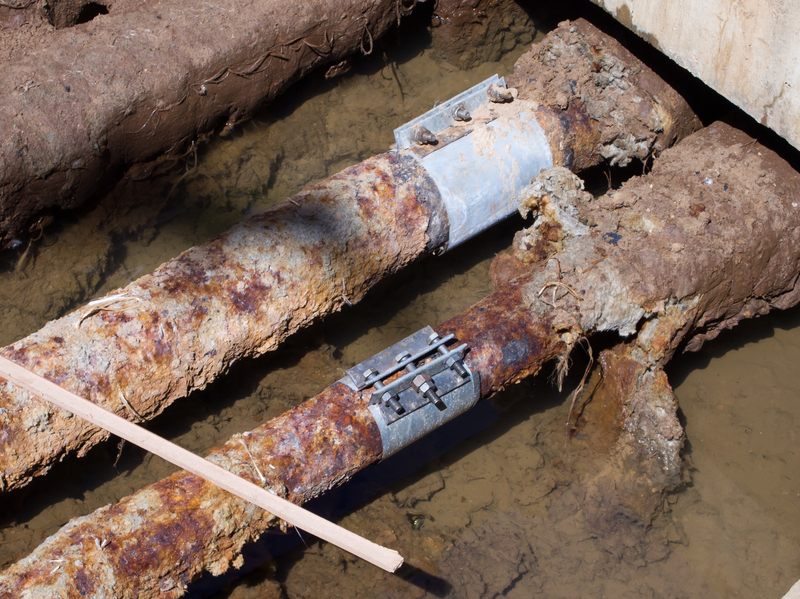Materials and Florida Laws, Rules & Ethics 18 PDH Discount Package 1
Courses in this Package
Structures and Properties of Metals (T07-001)
Corrosion: Overview (H04-001)
Coating Application and Inspection (T03-001)
Thermal Stress and Brittle Fracture of Material (T02-001)
Engineering Laws, Rules and Ethics for Florida Professional Engineers (FL2-006)

The online engineering PDH course addresses two aspects of metals. The first part of this course deals with the basic structures of metals and how those structures are affected by various processes. In addition, it contains information on the various imperfections and defects that the metal may sustain and how they affect the metal. The second part contains information on metal properties which are considered when selecting material for engineering design purposes. Each of these properties contains a discussion on how the property is affected and the metal's application.
This 7 PDH online course is applicable to structural and mechanical engineers, construction and design personnel, technical staff and facility operators who are interested in gaining a better understanding of the structures and properties of metals.
This PE continuing education course is intended to provide you with the following specific knowledge and skills:
- Understanding bonding
- Learning about common lattice types
- Understanding grain structure and boundary
- Learning about polymorphism and alloys
- Knowing the imperfection in metals
- Learning about stress and strain and Young's
- Modulus Understanding stress-strain relationship
- Understanding the physical properties of materials
- Learning about working metals and corrosion
- Understanding hydrogen embrittlement
In this professional engineering CEU course, you need to review Modules 1 and 2, "Structures and Property of Metals" of the Department of Energy Publication DOE-HDBK-1017/1-93, "Material Science".
Upon successful completion of the quiz, print your Certificate of Completion instantly. (Note: if you are paying by check or money order, you will be able to print it after we receive your payment.) For your convenience, we will also email it to you. Please note that you can log in to your account at any time to access and print your Certificate of Completion.

This online engineering PDH course provides basic information on the chemical interaction taking place during the corrosion process between the environment and the corroding metal. It also describes preventive measure to minimize or control the corrosion process.
Uncontrolled corrosion can cause many serious problems. Corrosion occurs continuously, and every metal in every facility is subject to some type of corrosion. Even though corrosion cannot be eliminated, it can be controlled.
This 4 PDH online course is applicable to chemical and environmental engineers, design and construction personnel, technical staff and facility operators who are interested in gaining a better understanding of the theory of corrosion.
This PE continuing education course is intended to provide you with the following specific knowledge and skills:
- Corrosion theory
- General corrosion
- Crud and galvanic corrosion
- Specialized corrosion
In this professional engineering CEU course, you need to review Module 2, "Corrosion" of the Department of Energy Publication DOE-HDBK-1015/1-93, "Chemistry".
Upon successful completion of the quiz, print your Certificate of Completion instantly. (Note: if you are paying by check or money order, you will be able to print it after we receive your payment.) For your convenience, we will also email it to you. Please note that you can log in to your account at any time to access and print your Certificate of Completion.

This online engineering PDH course presents the technologies, techniques, advantages and limitations, equipment, typical coating types involved, and safety considerations for each type of application method.
The choice of an application method depends on the type of coating to be applied, the type and size of surface to be coated, and governing environmental regulations. There are various methods of coating application, including brush application, roller application, conventional spray, high volume-low pressure spray, airless spray, plural component spray, and electrostatic spray.
Approximately 85 percent of all premature coating failures are a result of poor surface preparation, inadequate mixing, thinning, and/or poor coating application. Onsite quality control inspection during surface preparation and coating application procedures can help prevent failures of these types. Proper inspection techniques must be combined with knowledgeable instrument use, good common sense, and thorough documentation of work activities and inspection checkpoints to help ensure specification compliance. The amount of inspection and the specific inspection checkpoints will vary with the type and size of the coating project. This course presents eleven quality control inspection procedures as follows:
- Pre-surface preparation inspection
- Ambient conditions
- Compressed air cleanliness
- Surface profile
- Surface cleanliness
- Paint storage, mixing, and thinning procedures
- Application techniques
- Wet and dry coating thickness
- Pinhole detection
- Adhesion
- Cure
This 3 PDH online course is applicable to engineers, design and construction personnel, and other technical professionals who are interested in gaining a better understanding of coating application and inspection.
This PE continuing education course is intended to provide you with the following specific knowledge and skills:
- Methods of coating application
- Documentation of coating applications
- Pre-surface preparation inspection
- Measurement of ambient conditions
- Assessment of compressed air cleanliness
- Measurement of surface profile
- Evaluation of surface cleanliness
- Paint storage, mixing, and thinning
- Measurement of wet coating thickness
- Nondestructive measurement of dry coating thickness
- Destructive measurement of dry coating thickness
- Cleanliness and time (cure) between coats
- Holiday/pinhole detection
- Adhesion testing and evaluation
In this professional engineering CEU course, you need to review Chapters 8 and 9 of the “Painting: New Construction and Maintenance” engineering manual, published by the United States Army of Corps of Engineers (USACE), Publication Number EM 1110-2-3400.
Upon successful completion of the quiz, print your Certificate of Completion instantly. (Note: if you are paying by check or money order, you will be able to print it after we receive your payment.) For your convenience, we will also email it to you. Please note that you can log in to your account at any time to access and print your Certificate of Completion.

This online engineering PDH course addresses the effects of thermal stress and thermal shock on a system. It explains how thermal stress and shock combined with pressure can cause major damage to components. This course also addresses ductile and brittle fracture. It describes how ductile and brittle fractures are affected by the minimum pressurization and temperature curves. It also explains the reason why heatup and cooldown rate limits are used when heating up or cooling down a system.
This 2 PDH online course is applicable to structural and mechanical engineers, construction and personnel, technical staff and facility operators who are interested in gaining a better understanding of thermal stress and brittle fracture of materials.
This PE continuing education course is intended to provide you with the following specific knowledge and skills:
- Thermal stress
- Pressurized thermal shock
- Brittle fracture mechanism
- Minimum pressurization-temperature curves
- Heatup and cooldown rate limits
In this professional engineering CEU course, you need to review Modules 3 and 4, "Thermal Stress and Brittle Fracture" of the Department of Energy Publication DOE-HDBK-1017/1-93, "Material Science".
Upon successful completion of the quiz, print your Certificate of Completion instantly. (Note: if you are paying by check or money order, you will be able to print it after we receive your payment.) For your convenience, we will also email it to you. Please note that you can log in to your account at any time to access and print your Certificate of Completion.

Upon successful completion of the “Engineering Laws, Rules and Ethics for Florida Professional Engineers” course, we will report your PDH credits for this course to the FBPE within 2 business days. Therefore, it is imperative that you indicate your Florida PE license number in your CED account so that we can successfully do so. Once reported, please allow up to 48 hours for the FBPE to update their database.
This online PDH course is a FL approved Engineering Laws, Rules and Ethics course and is being offered by Continuing Education and Development, Inc, a FL approved Continuing Education Provider (CEP No. 0004183).
The first part of this course begins with an overview of the Laws and Rules governing the practice of engineering in the State of Florida (Chapter 1) including:
- Florida Statutes, Chapter 455, “Department of Business and Professional Regulation”
- Florida Statutes, Chapter 471, “Engineering”
- Florida Administrative Code, 61G15, F.A.C., “Florida Board of Professional Engineers”
Then it continues to address the rules amended, adopted or otherwise repealed from 61G15, F.A.C. (Chapter 2) as well as the changes to Chapters 455, F.S. and 471, F.S. (Chapter 3), within the preceding biennium, as applicable.
The second part of this course presents engineering ethics and the principles of professional responsibility (Chapter 4). It further illustrates the application of Chapters 455 and 471, F.S. to a randomly selected set of ethical and disciplinary cases (Chapter 5).
This 2 PDH online engineering course is applicable to Professional Engineers licensed in the State of Florida and who are required to demonstrate continuing professional competency in the Florida Laws, Rules and Ethics as a condition of license renewal. For each renewal period, every licensee must complete eighteen (18) professional development hours as follows:
- One hour must relate to this chapter and the rules adopted under this chapter;
- One hour must relate to professional ethics;
- Four hours must relate to the licensee’s area of practice; and
- The remaining hours may relate to any topic pertinent to the practice of engineering.
This PE continuing education engineering course is intended to provide you with the following specific knowledge and skills:
- Understanding the different Florida laws and rules regulating the practice of engineering in the State of Florida and their application to Professional Engineers
- Learning the rules adopted, amended or repealed from 61G15 within the preceding biennium
- Learning the changes made to Chapters 455, F.S. and 471, F.S. within the preceding biennium
- Understanding ethical behavior and the principles of professional responsibility in the field of engineering
- Understanding the general application of Chapters 455 and 471, F.S. to various ethical and disciplinary cases of Professional Engineers
Upon successful completion of the quiz, print your Certificate of Completion instantly. (Note: if you are paying by check or money order, you will be able to print it after we receive your payment.) For your convenience, we will also email it to you. Please note that you can log in to your account at any time to access and print your Certificate of Completion.